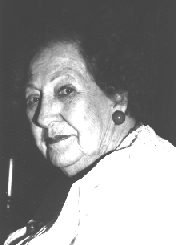Page 3
We were a very poor family, so everybody in the family tried to work at something or other. [Telephone interruption.]
We were talking about going to war. It was a horrible experience to see how they grieved over saying goodbye to these two boys, two young men. One was in law school at the University of Texas, and he volunteered. He was one of the first volunteers. The other one was married, but he was going. Later on, another brother was about to go, when the war ended. During the war, we in our house had two stars on the door as a flag for service, and we knitted, and I helped knit, wristlets for the wrists of the soldiers, and gloves and scarves and things like that. We would gather around with the neighbors, a group at our house, knitting and sewing, like cousins and relatives and friends.
Then at school, we had these patriotic parades. Oh, we were terribly patriotic. We sang these songs and learned all of these songs. We would march downtown in parades. I marched in many a parade around the square.
Then we had a square in our town, a courthouse square, which was wonderful. Every Friday night they had a concert there. This was in the summer, of course. You didn't go with kids from the other parts. This was a very restricted town. You didn't see kids from East Tyler or North Tyler. We lived in Southwest Tyler, I guess. Anyway, I would meet some of these kids. We were allowed to go around the square by ourselves for maybe a time or two, and we would meet other kids and talk to them and play with them and dance with them and play games with them. Then we'd meet there every Friday night. We found out there were kids from other parts of town. [Laughter.]
Then when World War I was over, it was five o'clock in the morning, and my mother got us all out of bed, and we knelt down and said our prayers. My brothers had met overseas, which was very unusual. They were never captured, and we were very grateful for that.
Another thing, we did church in our house. My father was a devout Episcopalian. He converted my mother from Methodism, and she became such a great—she sang in the choir, and every time the church door opened, we were there. We had to walk about a mile and a half or two miles to get to the church, but we went to every service. Then we went to midnight Christmas Eve, midnight mass.
Another thing I remember very much was singing in groups for Christmas and Easter. We would go and practice hymns for a long time beforehand, and that gave us a lot of group feeling. We just had a lot of patriotism about our city and our town. We were trying very hard to get new industry, and trying very hard to upgrade the town. We watched very carefully everything that went on.
In our home, we had friends from time to time, and it got to the point, since as I grew up, I had a big house, I used to have a lot of parties. We had a huge room, a parlor, that we would have parties in and we could have dances in. We had a player piano that you pumped music. I would take meal from the kitchen and put it on the floor in the parlor, roll up the rugs and put the meal on the floor and pack it in, make it real slick for dancing. We had great dances there.
Knight: Sounds like you grew up in a very sociable environment.
McClendon: I did. Yet my brothers and sisters were always so nice to me, because I was the youngest in the family. I had a better life than they did, and they were just wonderful to me. Then when it came time for me to go to school, one of my sisters, a schoolteacher, she didn't have a great huge bill [to pay], but she provided all the tuition for me to go to Tyler Junior College in my town for two years. If it hadn't been for the Junior College, I wouldn't have gotten to college, because there was no money. We had a huge vegetable garden which we shared

